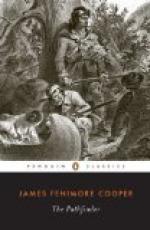Pathfinder, though a man of peculiar habits and opinions, was always thoughtful, and disposed to view the things around him with a shade of philosophy, as well as with seriousness. In him, therefore, the scene in the blockhouse awakened no very novel feelings. But the case was different with Cap: rude, opinionated, dogmatical, and boisterous, the old sailor was little accustomed to view even death with any approach to the gravity which its importance demands; and notwithstanding all that had passed, and his real regard for his brother-in-law, he now entered the room of the dying man with much of that callous unconcern which was the fruit of long training in a school that, while it gives so many lessons in the sublimest truths, generally wastes its admonitions on scholars who are little disposed to profit by them.
The first proof that Cap gave of his not entering so fully as those around him into the solemnity of the moment, was by commencing a narration of the events which had just led to the deaths of Muir and Arrowhead. “Both tripped their anchors in a hurry, brother Dunham,” he concluded; “and you have the consolation of knowing that others have gone before you in the great journey, and they, too, men whom you’ve no particular reason to love; which to me, were I placed in your situation, would be a source of very great satisfaction. My mother always said, Master Pathfinder, that dying people’s spirits should not be damped, but that they ought to be encouraged by all proper and prudent means; and this news will give the poor fellow a great lift, if he feels towards them savages any way as I feel myself.”
June arose at this intelligence, and stole from the blockhouse with a noiseless step. Dunham listened with a vacant stare, for life had already lost so many of its ties that he had really forgotten Arrowhead, and cared nothing for Muir; but he inquired, in a feeble voice, for Eau-douce. The young man was immediately summoned, and soon made his appearance. The Sergeant gazed at him kindly, and the expression of his eyes was that of regret for the injury he had done him in thought. The party in the blockhouse now consisted of Pathfinder, Cap, Mabel, Jasper, and the dying man. With the exception of the daughter, all stood around the Sergeant’s pallet, in attendance in his last moments. Mabel kneeled at his side, now pressing a clammy hand to her head, now applying moisture to the parched lips of her father.
“Your case will shortly be ourn, Sergeant,” said Pathfinder, who could hardly be said to be awestruck by the scene, for he had witnessed the approach and victories of death too often for that; but who felt the full difference between his triumphs in the excitement of battle and in the quiet of the domestic circle; “and I make no question we shall meet ag’in hereafter. Arrowhead has gone his way, ’tis true; but it can never be the way of a just Indian. You’ve seen the last of him, for his path cannot be the path of the just. Reason is ag’in the thought in his case, as it is also, in my judgment, ag’in it too in the case of Lieutenant Muir. You have done your duty in life; and when a man does that, he may start on the longest journey with a light heart and an actyve foot.”




